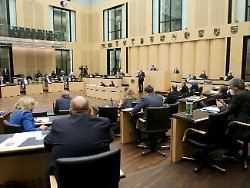Friday 19th November 2021
Update
Unanimous vote despite criticism
Federal Council approves traffic light corona plans
The dispute is off the table for the time being: After the Bundestag, the new Infection Protection Act from the SPD, Greens and FDP will also pass the Bundesrat. However, this does not completely resolve the quarrels about the paper. They have only been postponed, as the Union explicitly emphasizes.
The Federal Council has passed the new Infection Protection Act. The new regulation, which enables corona measures of national scope even after the epidemic situation has expired, was unanimously approved in the regional chamber, as Federal Council President Bodo Ramelow said. At the beginning of the meeting, the left-wing politician called for a joint effort: “We must not let up in our efforts, because the virus uses every chance it has to spread.”
The new Infection Protection Act regulates 3G in the workplace, on buses and trains, but for the time being no longer provides for exit restrictions and nationwide school closings. The Union had originally threatened a blockade: the new “toolkit” restricted the countries’ possibilities too much and was not enough to break the wave of infections, CDU politicians had criticized. After a federal-state round on Thursday, however, a compromise emerged: The law of the traffic light parties should be evaluated in three weeks and, if necessary, improved.
That is the reason why the law can be approved in the Federal Council at all, made clear several Prime Ministers of Union-led countries. In terms of content, the plans of the traffic light parties are wrong and dangerous, said the Prime Minister of Hesse, Volker Bouffier. The SPD, Greens and FDP would have been wrong – but not the size to admit that. The Union states now only agreed to prevent one from ending up with no legal basis for corona requirements, said Saxony-Anhalt’s Prime Minister Reiner Haseloff and North Rhine-Westphalia’s Prime Minister Hendrik Wüst.
Bouffier: “Fatal signal to the population”
The Infection Protection Act includes, among other things, 3G requirements in the workplace as well as on buses and trains. In this case, proof of vaccination, recovery or negative test would be necessary. For nursing homes and clinics, test obligations are provided for employees and visitors. In addition, the obligation to work from home is returning. Those who forge vaccination passports can be punished more severely. Contact restrictions, rules on keeping your distance, the mask requirement and access restrictions only to vaccinated and convalescent people are still possible (2G).
On the other hand, however, nationwide closings of schools, daycare centers, companies and shops should no longer be possible in the future. Only individual facilities with particularly high numbers of infections can be closed, but not all in a district or even a federal state. Restrictions on travel, accommodation and closings of restaurants are also taboo with the new law.
The Union considers that to be risky. It could not be that the nationwide closure of the catering trade is no longer possible, said Wüst on Thursday evening. In addition, the current legal basis for corona requirements, the “epidemic situation of national scope”, should not simply expire. That was a “fatal signal to the population,” said Bouffier. This state of emergency has so far given the state governments the opportunity to take far-reaching steps by means of a simple ordinance.
Compulsory vaccination in certain professions is being examined
According to the will of the traffic light parliamentary groups, the state parliaments will in future decide on many issues, such as restrictions on cultural and sporting events. In the coming weeks, there will already be restrictions on the unvaccinated in particular. The federal and state governments decided on Thursday that in future they will no longer have access to leisure events, restaurants and hotels where a certain number of corona patients are admitted to hospital. Most countries are already breaking this threshold. 2G is to apply here in the future, i.e. participation only for those who have been vaccinated and those who have recovered.
The federal states also asked the federal government to introduce compulsory vaccinations in certain facilities such as hospitals and nursing homes for everyone who has contact with people who are particularly at risk. Executive Chancellor Angela Merkel announced that the federal government would make a decision on this shortly. The controls of vaccination and test records are also to be tightened.
